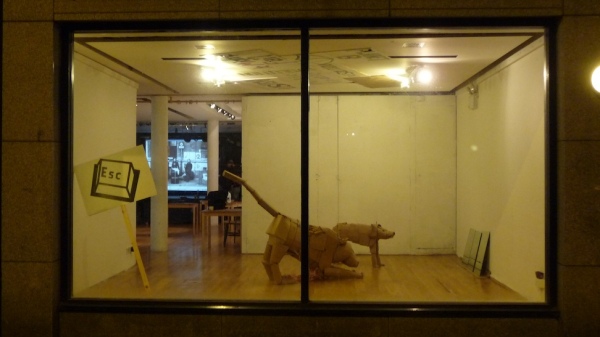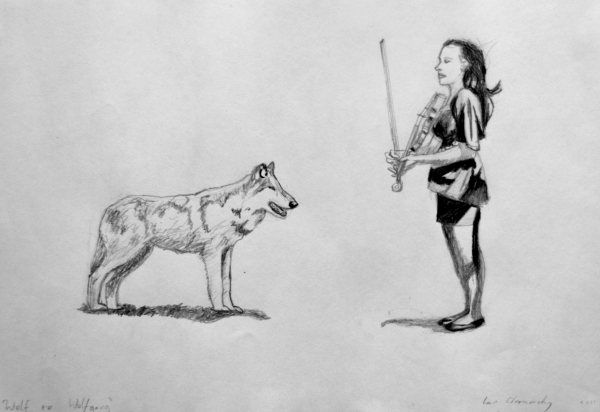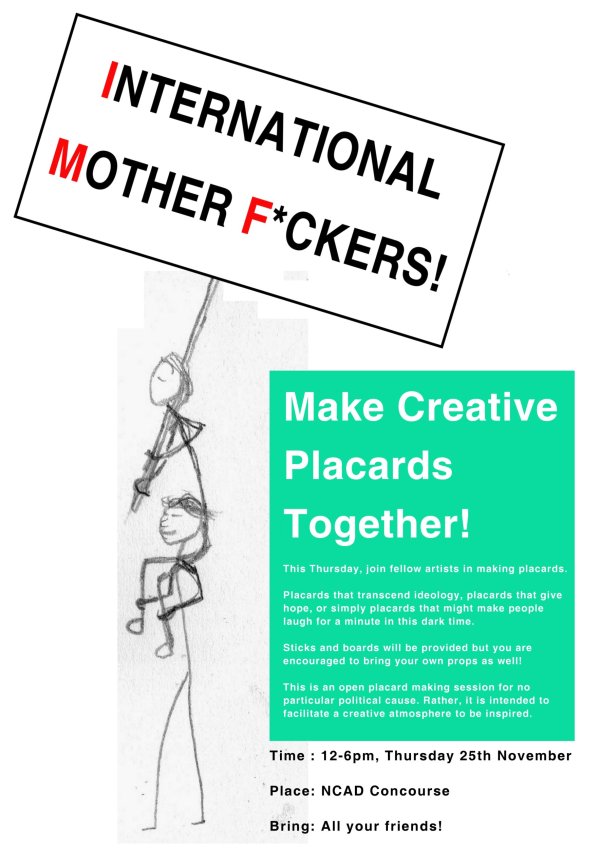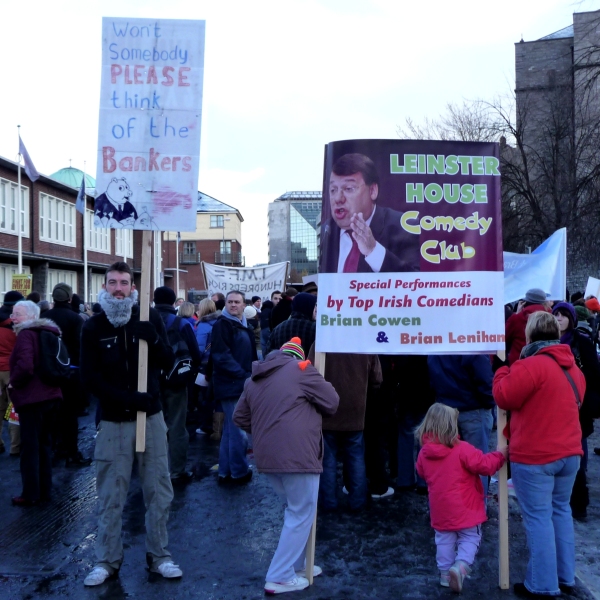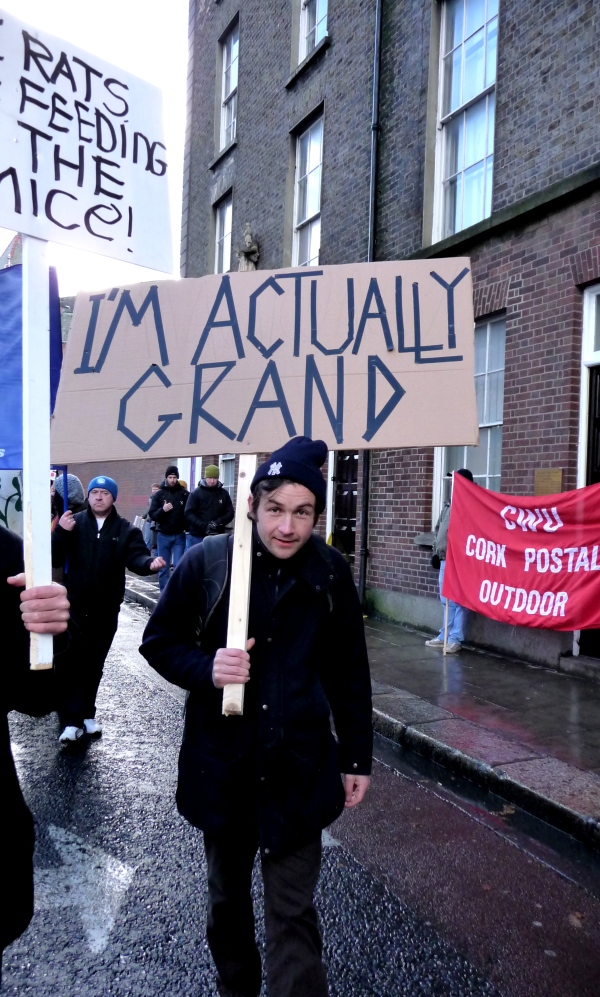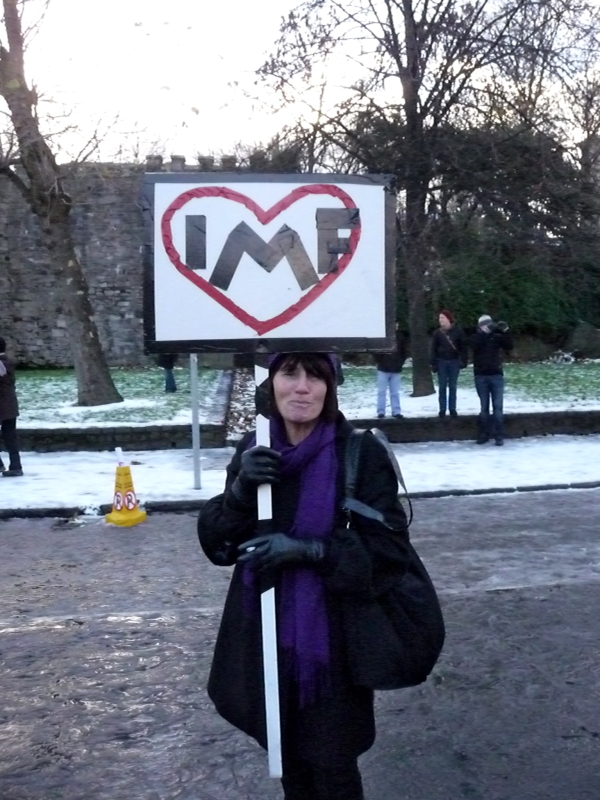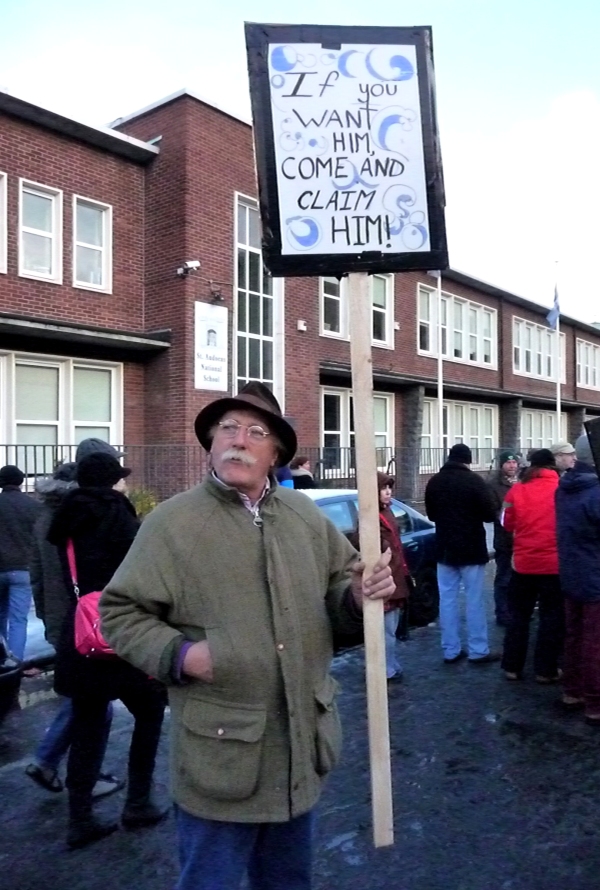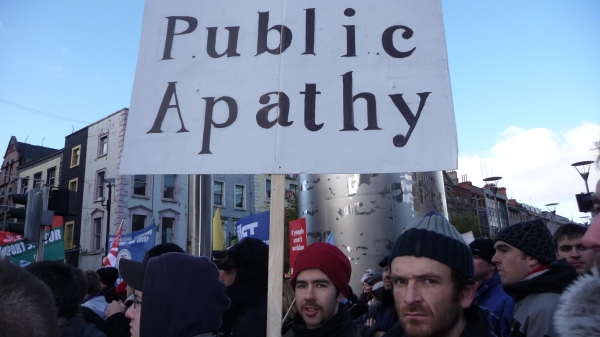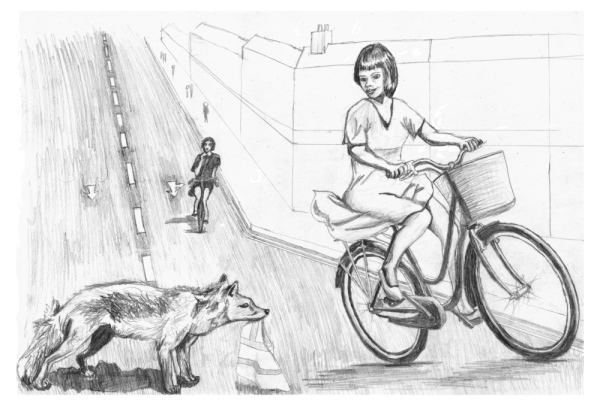Population Cartograms
These really give a different perspective on the world! I find it interesting how some countries are overwhelmingly focused on one city, but the populations of others, like Italy and Germany, are more uniformly distributed, to the point that the cartogram doesn’t look that different from the physical map. Could it be, that Germany’s history as a collection of independent states has been the main influence on its current population distribution?
Look here and compare countries! Simply click on a country on the physical map to see the cartogram.
Deutschland rundet auf

Campaign to raise money for charities in Germany.
Exhibition in Fishbowl Gallery, Exchange Dublin
Between the 7th and 14th March 2011 I showed some sculptural work in Exchange Dublin’s Fishbowl Gallery.
It’was a solo exhibition of new art work in this Temple Bar youth arts centre. The work reflected my feelings about the horrifying mix of circus shows and insurmountable economic problems that now characterise Irish politics.
Wolf to Wolfgang
Election Fever
Here in Ireland we’ve got election fever until 25th February.
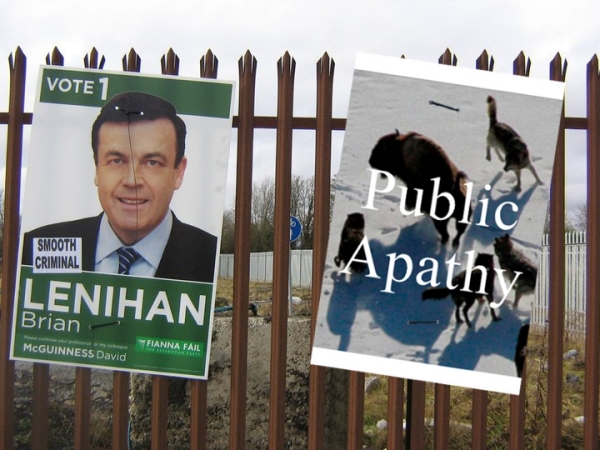
One of my posters up next to that of Finance Minister Brian Lenihan, whose decisions have brought Ireland's situation from bad to worse..
Experience my full commentary and analysis at my exhibition from 7th-14th March at Exchange Dublin in Temple Bar.
International Mother F*ckers!
On Thursday 25th November 2010 I organised a workshop in NCAD to bring artists together to make creative and funny placards to hold in public. Due to further austerity measures that are about to be imposed by the EU, IMF and the Fianna Fáil government in Ireland, there are a lot of protests taking place here.
Against this background of universal broo-ha-ha, I thought it would a worthy contribution to make placards that can transcend ideology, placards that give hope, or simply placards that might make people laugh for a minute in this dark time.
The group that created some fifteen placards on that day agreed to meet up on Saturday 27th November to take part in a large demonstration against the cuts, organised by the Irish Congress of Trade Unions. Here are pictures from that demo, featuring the placards we made.
Worms on a Tram
I have become again fascinated with the beauty in the movements of traditionally ugly creatures, and their reaction human-fabricated surfaces. See my previous video The Day Dublin Airport Stood Still as another example. The video below is best viewed in full screen.
Ian joins the RAF
Well, not that RAF. Between today and 4th October, some of my video work will be on display in the window of Superquinn in Ranelagh village, opposite the Luas bridge. This is one of many artworks deposited in the shop fronts of many retailers throughout the Dublin suburb, as part of the sixth annual Ranelagh Arts Festival.
Fox, 21st Century
This is a drawing I made at the end of May for Ireland’s National Bike Week Art Exhibition. It was exhibited in Gallery #1 in Dublin, along with 30 other successful entries on 17th June.
It will also feature in the art exhibition of the Cork Cycling Arts Festival, 19th-25th July 2010. The exhibition takes place in the Unitarian Church, Princes St, Cork city.
In the foreground, a girl on her bicycle and a fox encounter each other in a fictional Dublin suburb, modelled on Rathmines.
Copenhagen Report: Back From The UN Climate Conference
Originally published in Dublin local newspaper LifeTimes, 27/01/2010
In December, Copenhagen was host to the UN Conference on Climate Change. Rathmines resident Ian Clotworthy went with 25 other Irish people, and thousands from around the world, to support global justice there.
I have been involved for some two years in climate change activism. It is not because of polar bears, but because everything that all campaigners for social justice have ever fought for – food, clean water, shelter, security – is jeopardised by climate change. The conference was pegged to be the most important international meeting since World War II. With this in mind, we arrived in the Danish capital after a 40-hour bus journey on 10th December.
Through friends and from news reports I learned that this summit was scarcely more than a carbon trading fair with a conference attached. The proposals being put on the table by developed countries were led primarily by the interests of large agribusiness and fossil fuel industries. To explore them all would go beyond the scope of this article, but I will give one example of a process that demonstrates that their priorities are all wrong.
Global warming is not only caused by burning fossil fuels. Almost half of world emissions come from changing how land is used. When you drain a bog or fell a rainforest, for instance, the soil releases huge amounts of greenhouse gases. When small farms producing diverse crops are converted into vast fields growing one crop, the same happens.
Biochar is a method of storing carbon in the soil in the form of charcoal. Research indicates that this can improve soil fertility and strip carbon dioxide from the air. Many small-scale farming communities in south India have embraced it. However, governments of the western countries that emit the greatest amount of carbon dioxide favour the worldwide expansion of carbon trading. This creates a market for carbon credits whereby industries can pay other people to cut emissions rather than do it themselves.
The value of credits is determined by the price of carbon. In a place like south India, western transitional corporations would swoop in the moment that the value of credits exceeded the value of food crops. Millions of smallholders would be dispossessed of their land by companies that specialise in planting vast areas with one crop and burying charcoal for the purpose of earning carbon credits.
Events so far suggest that the material to form the charcoal would come from logging rainforests and charring the trees. Peter Read, a major advocate of commercialised biochar, argues that land more than twice the size of India be turned over to producing wood for charcoal, despite the fact that almost any organic waste material, from straw to sewage, can be charred at a local level by the small farmers whose existence and property rights he ignores.
In this way you can see how a good idea that can cut emissions and improve the lives of the majority of the people in the world can be corrupted by vested interests into a scheme that ruins communities and increases emissions. The politicians are willing to play Russian roulette with the only climate we have, but they are not willing to introduce and sensibly regulate real solutions. The priority is profit for a few, not a habitable world for the many.
Klima Forum
In the Irish media the main focus was on Obama, and on the protests outside. But we were not just there to protest. For in the centre of the city, one of Copenhagen’s flagship conference centres was hosting Klima Forum – the Peoples’ Climate Summit. This was a gathering of people working in the global justice movement to share real solutions that can stabilise the climate and empower developing countries to prosper sustainably. Activists came from not only Europe but also Asia and South America. Since this was the one of the most important international meetings that has ever taken place, it was worth coming to share ideas, plans, networks and resources with each other. That way, everyone has taken home something new to build their campaigns.
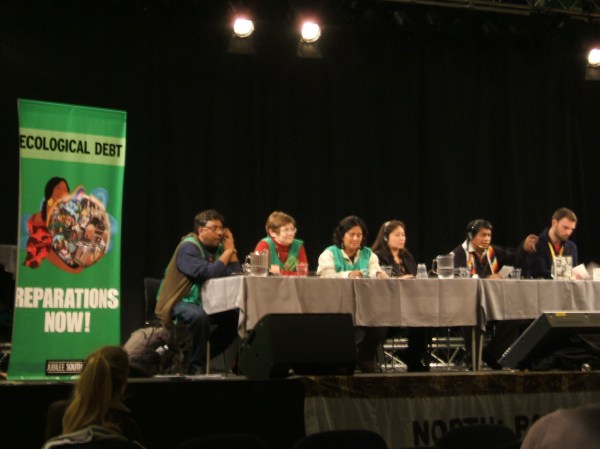
One of the three Panels of Speakers in the talk, "Towards a People's Tribunal on Climate Justice and Ecological Debt", 16:00-20:00, 10th December 2009
The schedule of the Klima Forum was packed, with about eight workshops taking place at any one time between ten in the morning and eight in the evening for two weeks solid. Topics ranged from the effects of climate change on Central America, protecting land rights, to building a popular movement to discussion of climate adaptation finance to developing countries. There were talks that criticised, such as Why Carbon Markets Won’t Work, and talks that outlined positive alternatives, such as the Transition towns movement that builds a local resilient economy. Examples of the latter can be found in Kilkenny, Kenmare and numerous other towns even here! People are already creating the future in their interests.
All in all, I was greatly inspired by the size and unity of the climate justice movement, of people from all continents rich and poor. From the outset there was a sense of sublime internationalism in the Klima Forum. Fresh ideas and the determination to enact them were sparking off all sides, and solutions that could stop catastrophic global warming and redress global injustice rather than exacerbate it. It contrasted strongly with the show of bickering nation states that exposed serious divisions between rich and poor countries, and caused the failure of the conference.
I was also traumatised by new knowledge of how serious the situation was, and how corrupted by vested interests the negotiations had become. Dr Lumumba Di-Aping, spokesman for the developing world bloc, pointed out that even to accept a further two degree rise in world temperatures (as suggested by the EU) will destroy the livelihoods of millions and cause migration without precedent. To sign on to it would be “a suicide pact for Africa,” he said as he condemned in the strongest terms the document put together by a group of ‘key players’ hastily assembled by Barack Obama to save face at the end of the conference.
So what can be done? The first thing that I would say is that we can’t afford to despair. The stakes are far too high to throw up our hands, especially for young adults like me. German activist Susi Hammel put it well, “we see climate change as a fight for our future, and the survival of future generations is not negotiable!”
Most people with a sensible degree of cynicism never expected much from the Copenhagen negotiations. But I think even more now that our politicians invariably lack the imagination and will to redress the climate mess. Because money in brown envelopes speaks louder than petitions, the only way to deal with such people is through fear. We need a popular movement that will make politicians afraid to treat vested business interests as if they were equal to the survival of my generation.
It is up to us citizens to do this job near where we live. We can bypass politics and start working on future-proofing ourselves directly. The transition town model began in Kinsale and has been growing in Ireland and Britain for the last five years. It offers a credible solution to make our communities stronger, more resilient to recession and oil supply problems, and a better quality of life through all this. There is even evidence that it is starting to influence UK Government policies. This country has had too much doom and gloom, and it is time that we all began to notice and emulate the communities that are doing it for themselves and quietly, inadvertently, changing the world for the better.
In this article I have used many terms that may have been new to you. I have tried to explain them but the topic is a complex one that is poorly understood by most of the media in Ireland. But we are lucky here to have the internet, an incredible resource of information. So if you want to know more, why not search for more information about the issues in this article? Knowledge, after all, is power.
